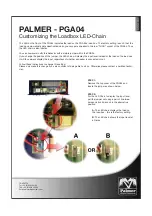
Maintenance
Operation and maintenance manual
30
KHO/340/EN/1.0.0.
C
Shaft sleeve
5. Remove the impeller by using the extraction tool (Figure 28, point A).
Slide the extraction tool on to the shaft and tighten screws through the
holes on its flange to the threads on the impeller hub (figure 28, point B).
Pull out the impeller by tightening the extraction screw located at the end
of the extraction tool.
Figure 28. Removing the impeller with the extraction tool
A
Extraction tool
B
Screw × 4
Once the impeller starts moving, it can be pulled out the rest of the way by
hand.
4.8.3. Installing the impeller
New and repaired impellers are fitted in the same way.
The thrust caused by the impeller is transmitted to the shaft through a spacer.
Before installing the impeller, make sure that the spacer plate (figure 29, point
B and the spacers (figure 29, point A) are in place.
Installing the spacer plate and spacers:
Install the spacer plate and the spacers by sliding them on to the shaft and
pushing them as far as they will go. The spacer plate and the spacers must be
installed in the order shown in the figure below (figure 29).
Summary of Contents for AJ 340
Page 1: ...Operation and maintenance manual ...
Page 2: ......
Page 4: ......
Page 10: ...The jet propulsion unit Operation and maintenance manual 6 KHO 340 EN 1 0 0 ...
Page 18: ...Operation Operation and maintenance manual 14 KHO 340 EN 1 0 0 ...
Page 38: ...Maintenance Operation and maintenance manual 34 KHO 340 EN 1 0 0 ...
Page 44: ...Problem situations Operation and maintenance manual 40 KHO 340 EN 1 0 0 ...















































